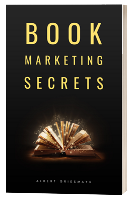

The bad news is that if you’re a writer, the odds are stacked against you. The good news is that there are ways you stack those odds in your favour to sell more books. There are many reasons why authors and their book projects fail. Fear. Doubt. Quitting. Impatience. Perfectionism. Ego. Bad marketing.
Most likely though, the majority of authors fail by not focusing on the fundamentals. Creating a great book. It starts and ends with the book, and it always will. Keep this rule top of mind throughout the whole process. It is the groundwork you lay for everything to come. True long-term bestsellers are great books.
This may seem obvious and every author knows it. But, how many focus on creating great books. Not only the words but everything else, which we’ll cover later on.
The Product Is The Book
Think of yourself, not as a writer, but a business owner. And the product you are selling is the book. Without it, you have nothing to sell. If you were to sell a ton of books, then you must have a great book to sell. The formula for massive books sales: A great book + substantial initial visibility + reviews & testimonials.
The first component of a great book is making sure that your audience likes it. The customer is the only metric that truly counts when spotting a great book.
A great book is loved by its target audience, has positive Amazon ratings of 4.25 and up, and achieves some form of organic growth or even virality with little to no advertising expense.
So you must get strong reviews and testimonials right away. What’s the first thing you do when you buy a book on Amazon? Read the reviews, right? “Reviews are the lifeblood of books in the digital age.” To get glowing reviews, you must first make sure to start from a solid foundation, which is an awesome book. That is ready to receive positive reviews from its target audience.
The method, which I call “Lean Book Publishing” is a way to test and improve your book to become great. It is a process of developing or improving an existing book based on feedback and interactions with the target audience.
Craft A Great Book
Like them or not, there’s no denying that Apple products are beautiful. From the minimal white packaging to the retail stores to their operating system. They are in part one of the most valuable companies in the world, as they are a good looking brand.
A luxury brand with beautiful products that people buy to signal wealth, power and sex appeal. I’m not asking you to make your book sexy to walk around your favourite cafe for a casual hookup.
Instead, you should adopt the mindset that Steve Jobs had with his products. The attention to detail to things that people wouldn’t even notice or care about. But Jobs cared. He saw himself as a craftsman-like a carpenter building a beautiful chest of drawers.
Steve Jobs obsessed over how everything looked inside and out. When engineers questioned him, stating that no one would ever see it, he reacted saying he ‘wanted it to be as beautiful as possible, even if it’s inside the box.’
Not only are you a business owner and writer, but you are also an artist. Like a composer, you pen a beautiful symphony of words together on a page. A painter who paints a good looking and attention-grabbing front cover. A sculptor that lays out the flow and structure of the book.
Perfection
Jobs was a perfectionist. A healthy dose of perfectionism means the ability to check your work and that you pay attention to the details. There’s a balance of course and you may fall into the trap of trying to write the ‘ perfect book.’ On one side of the perfectionism scale, your first draft is the last. It’s more like a brain dump scattered with mistakes and no structure or flow.
The problem with perfectionism is when it stops you from starting because you’re waiting for the right time to write. Or, it stops you from finishing because it is “never quite right.” So make sure that you find the balance, try to compromise as little as possible on your books quality, but do not get stopped out by trying to make everything perfect.
As James Victore says, Feck Perfuction.
Certainty
From working with over a hundred authors and helping them sell more books, the first thing I look at is the book. On the first consulting call, most of the time the authors aren’t even convinced they have the best book.
If you want to sell books, you’ve got to wait until you are in a place where deep down in your core, you know it’s the best. To sell, you have to be sold on your book. And that means you have to be certain that you have the best book possible. It’s an unconscious tell that your readers pick up on in your communication.
After the initial call, on average 20% of the clients I work with, their book needs a little polishing, while the rest need deeper optimisation. Out of everything else you can do, improving the book is by far the best thing you can do for success.
The problem is we are all busy. It’s a mighty achievement in-and-of-itself to finally finish the book. You want to get it out there and start making sales. But, any shortcut you make will hurt you – emotionally and financially – further down the line.
Too often, book projects fail because the initial launch does not bring the satisfaction an author wants. They move on, leaving behind a book which has far more potential. But which never got the attention it would need to shine.
Most authors fail when they reach, as Seth Godin refers to as, ‘The Dip. The book projects is exciting at the beginning. Authors invest time, energy and effort to then later quit at the dip, right before they are about to succeed. If they’ve done everything they could to write the best book possible, and make it through the Dip and end up on the other side with all the benefits.
Let’s assume a launch campaign.
Graph 1: With a great book, there’s an initial bump in sales followed by gradual and steady sales. Why? Word-of-mouth, good reviews, Good CTR’s (?)
Graph 2: With an average book, you may get some good sales at the beginning but in most cases, they soon fall. Why even start with writing an average book, waste a lot of time and money to quit later on.
Promotion
When it comes to promoting your average book, you will pay more for ads, you will get fewer reviews and try harder to convince a journalist to cover your story. It’s hard enough to write the book, now you have to sell it. You have to convince people to pull out their credit cards and buy your book.
First, you must focus on your book, instead of activities around it. “Every dollar spent in the book is worth more than the same dollar spent on advertising.”
Next, only after you have created a great book do you look to focus on how you are going to promote your book.
If you’ve done your job right, your book can spread like wildfire through word of mouth. Though, there still has to be some thought and method towards promotion.
Great Writer, Great Book
To write a great book, it means that you as a writer must be great. Great writing is simple but not easy. And I am sure that you know that writing those words is much easier than executing it, as much as I do. But I would like to push you a little bit and make you understand, as Tom Hanks says in a League of Their Own, “if it wasn’t hard everyone would do it. It’s the hard that makes it great.”
So, How Do You Become a Better Writer?
Get Your Mind Right
The first draft of anything is likely for the trash. When you start writing, go in thinking that you are going to write a bad first draft. Start by writing your book badly and haphazardly. Now, you have something – a crap first draft; that no one is ever going to see. It’s much better than nothing. It’s much better than procrastination. You’re getting the bad words out. Then, you throw away most of it and make the next one better.
Remember that it is the hardest draft you will write, so if you get that out of the way, you’re winning. It’s a process of being humble, continual iteration and moving forward. Through your experience, you get better as a writer.
We as authors tend to fail as we are afraid of failure and rejection. We fear expressing who we are by bearing their soul to the world. If the world rejects our work, it reflects on us as author’s and as people.
When authors are afraid to fail, they do nothing. They don’t write and they don’t publish. Authors are afraid to write a great book because they have never written a great book. Thus, for authors to overcome the fear is to become an authority. They become an authority through training.
To overcome the fear of failure, we as authors must fail early, fast, often and fail forward. Easier said than done, I know. It’s much easier to accept that you are a failure of an author than it is to do anything about it. It may be easier, but what do you get in the long run? It may be easier to sit in your underwear and binge-watch Stranger Things than it is to sit down and write. It’s easier to not risk failure, but as Rob Moore says, “If you don’t risk anything, you risk everything.”
To overcome the fear of rejection, authors must encounter it regularly. Did you know that 12 publishers turned down J.K Rowling before Bloomsbury published Harry Potter? Even the publishing house doubted the potential at first. It wasn’t until the chairman gave the first chapter to his eight-year-old daughter, who demanded to read more and more.
Don’t underestimate the power of doubt to keep you from becoming your best. For us as authors, it can be devastating. We underestimate our abilities and we don’t believe we can be authors. If you aren’t certain of your own product, how can anybody else be?
The Devil’s Wedge: “To be candid, this may be my most powerful weapon of all. I call it the wedge of doubt. When all my other tools fail me, I know I can always rely on doubt and discouragement to break the heart and shatter the will of man.” – Devil, The Devil’s Best Tool
In The War of Art, Steven Pressfield writes about a negative, repelling force that prevents people from doing their work. Writing elicits resistance which comes from within. For authors to overcome resistance they have to turn pro. A professional writer is there seven days a week whereas an amateur is a weekend writer.
Go in with the mindset that you are inevitably going to hit some bumps in the road. If you expect that you are going to make mistakes. Or, that you are going to write thousands of words that no one is ever going to see. Or, to stare into a blank screen with the cursor blinking at you. Then you know it’s a natural process that comes with the territory of doing something creative.
Get Your Process Right
You don’t set out to build a wall. Instead, you look to lay a single brick as best as humanly possible. Then, you will have a wall. “You get better as a writer by writing,” says Neil Gaiman. You put one word after the other and you keep doing it. Then, you will have a great book.
Schedule your writing time and stick to it. Most likely in the morning although if you’re a night owl and write best at night do it then. Somerset Maughan “ I write when inspiration strikes. Fortunately, it strikes every morning at nine o’clock sharp.” Your environment plays a role too. Having a certain place where you write and only write – a study or a cafe – primes your brain to write when going there. Some authors have a laptop and delete every single app except a word processor and turn off wifi to write with to avoid distraction. “Nothing great will ever be written on a computer with an active internet connection. ”
Get Your Style Right
Focus on improving your writing.
- Learn to compress by omitting needless words. Never express something in more words than required. Common useless words like, really, quite and very.
- Vary the rhythm of your sentences with quick, punchy sentences and fluid, flowery sentences.
- Use verbs – active over passive language. Words like take, get, jump etc. Verbs have the most influence on the meaning of a sentence.
- Add humour where necessary. Humour in anything you do; whether it’s broad, or subtle, is always vital. Sometimes it can be dry or overt. Humour is recognition.
The strength and raw power of the manuscript is the ultimate foundation for long-term success.
Putting Your Book To The Test
When analysing your book you can answer the following three questions. The goal is to get a yes with all three. If you answer no with any, you have more room for improvement.
- Does my book have the metrics of a great book? Customer satisfaction with positive Amazon ratings of 4.25 and up. Have you improved the 7 keys of book marketing? (I’ll explain in the next chapter).
- Do I know more than 10 readers who loved my book?
- Answer honestly: Is my book awesome? Besides the words on the page, there are other keys you need to work on for book success. I’ll share those with you in detail in the next article. These will put your book sales into the next gear.
In summary, you want to spend the majority of your focus on crafting a great book. It’s the foundation for your success. Get feedback from your target readers to make it even better then get strong reviews right away. Trust me, everything else will become easier or unnecessary if you focus on this one thing.
This article was largely written based on insights from my upcoming book “Book Marketing Secrets“. Be one of the first 1,000 authors to join my launch team and get all my books for free in 2020.”

Book Marketing Secrets : The 10 fundamental secrets for selling more books and creating a successful self-publishing career

Albert Griesmayr
Founder & CEO of the book publishing startup Scribando & Novelify.
Previously Albert was Head of Digital at Dorotheum and consults companies and authors in digital strategy, digital marketing and book promotion.
